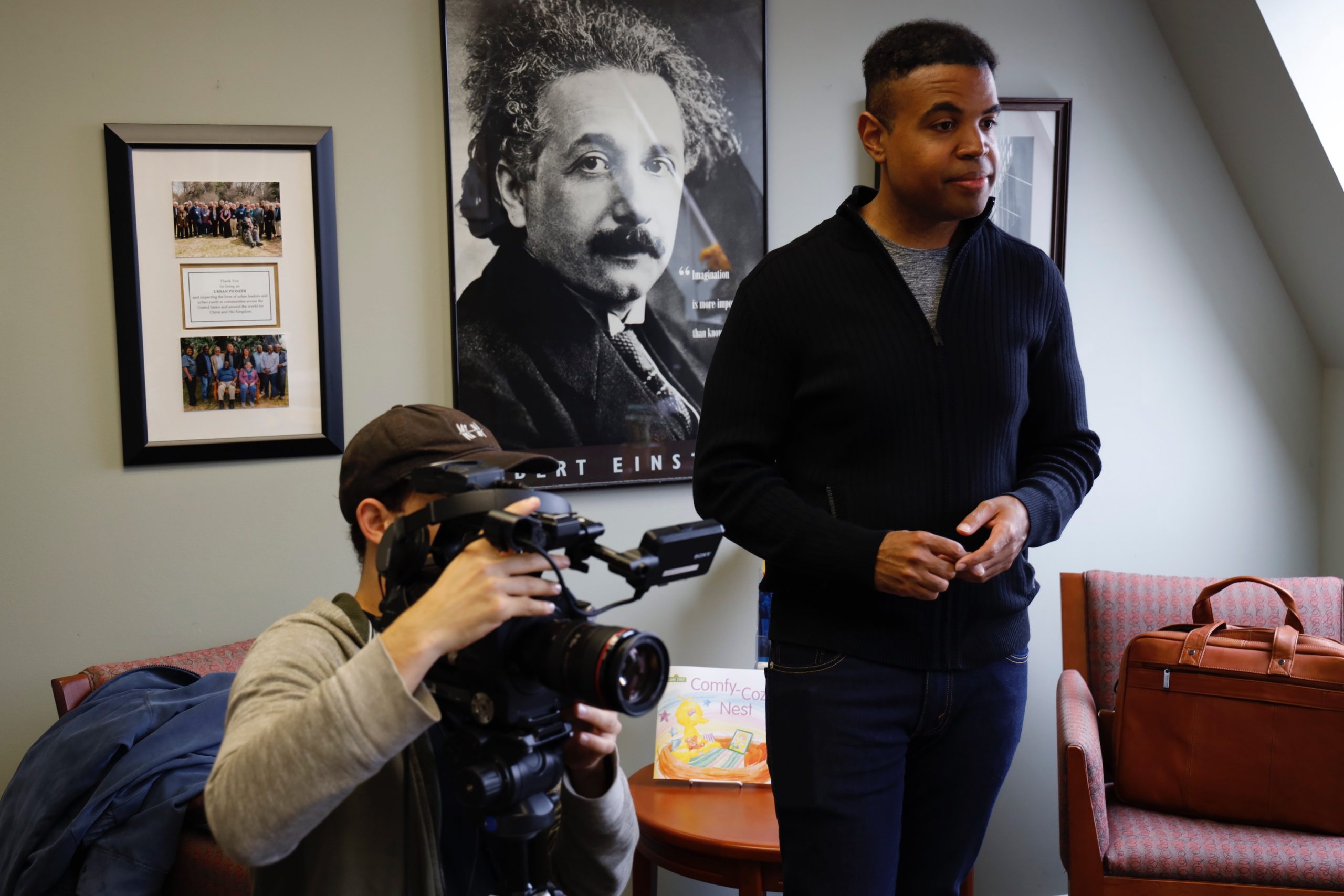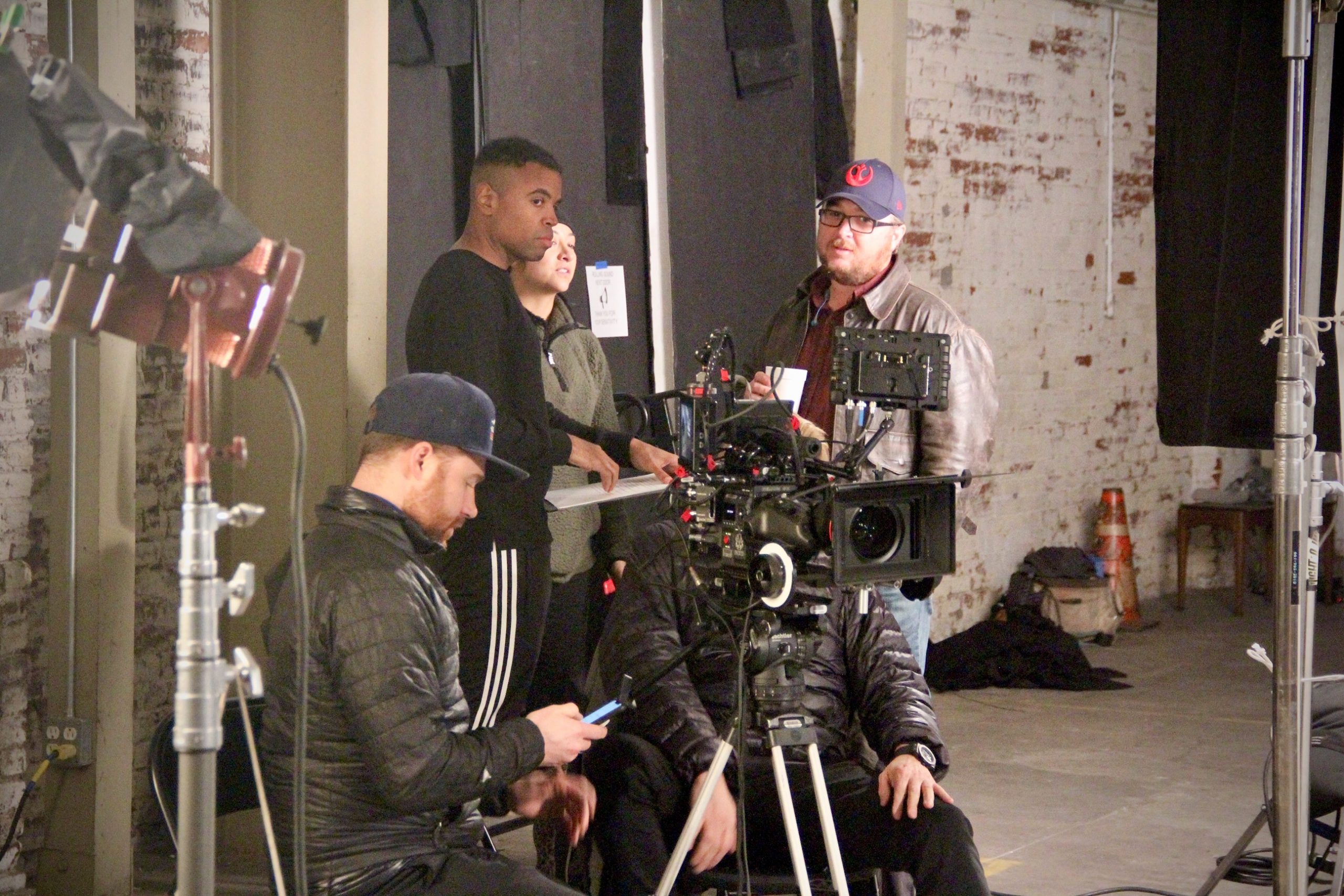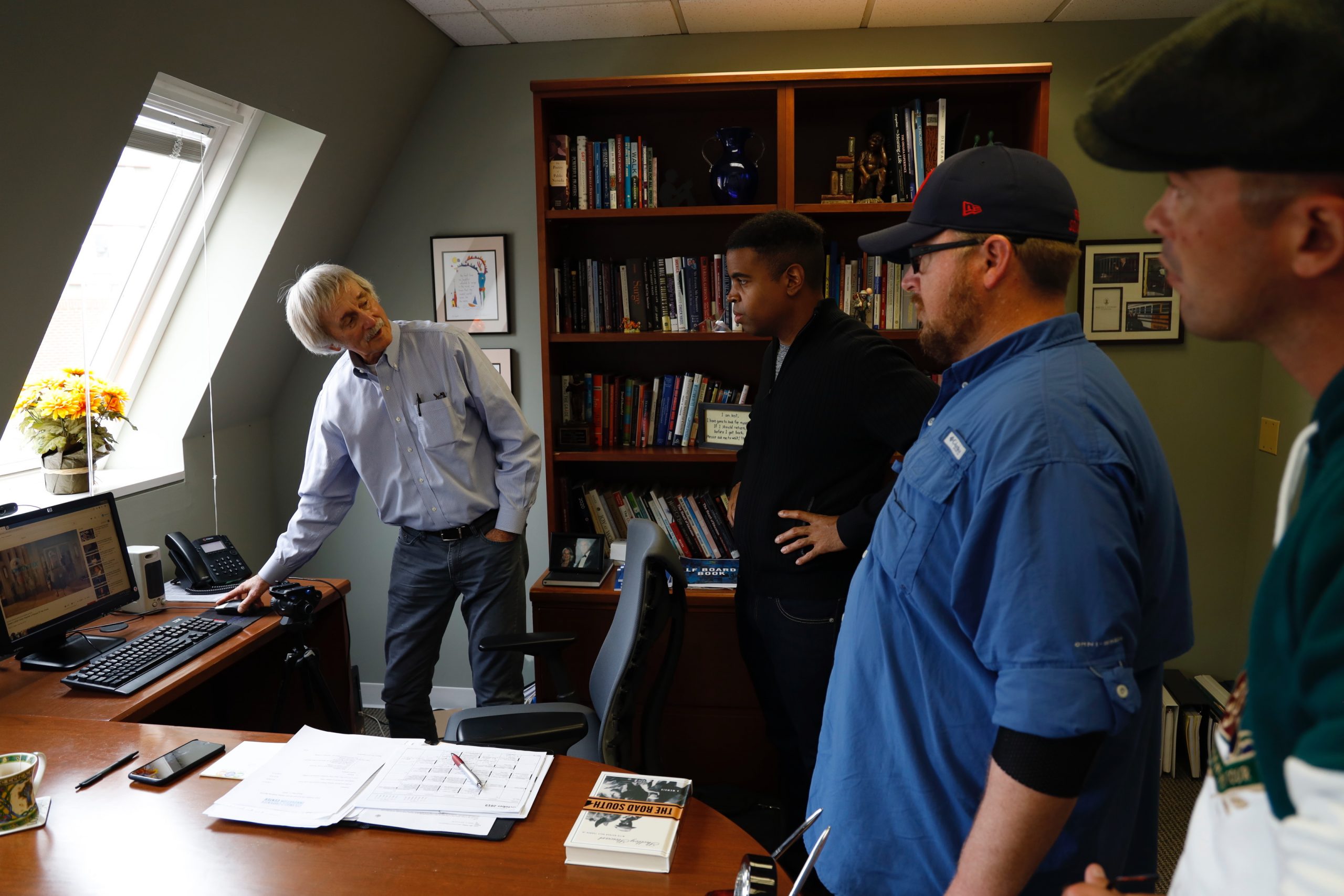
Disclaimer: One of the producers of the film, James Burns, is a contributor of LRM Online.
We’re not wanting for problems here in the United States. Americans are more divided than ever on pretty much any issue under the sun. Be it social, political, or economic in nature, both the left and right have found ways to conjure up some kind of heated political discourse. But, believe it or not, there are some problems that transcend partisan lines. One such issue is our education system.
One specific issue in question is the alarming number of high school dropouts our country has. It’s a much larger problem than one would think and is the subject of the upcoming documentary American Dropout. I had a chance to speak with director Dr. Robert Mark Carpenter and producer James Burns (who is also a contributor on the site) to discuss their film and this very serious issue.

LRM Online: Thank you guys for much for talking with me, or taking time out of your busy day. I know you have a busy week ahead of you, from what I’ve heard, so let’s jump right into it. Let’s talk about American Dropout. First of all, what is the elevator pitch for American Dropout? What is this documentary about?
Carpenter: American Dropout is a gritty take on the 50 million high school dropouts that exist in the United States. It is a problem that is the biggest civil rights, moral, and economic issue of our time that nobody’s talked about, and we essentially uncover it and expose it in a pretty shocking way by following four kids and crisscrossing the country and talking about their stories as really just only a handful of what’s going on to millions and millions of kids across our country.
LRM Online: When you say 50 million dropouts, what do you mean? Is that like 50 million living dropouts? What’s that number mean exactly?
Carpenter: There are 50 million current high school dropouts from the last few decades. About a million kids a year continue to drop out of school. That number is just 50 million in the United States alone who have dropped out of high school over the last few decades. These folks are ineligible for 90 percent of all jobs. They are 80 percent of all prison inmates, and they cost tax payers trillions of dollars in social services. This is a huge group of people that have essentially dropped out and continue to drop out.
LRM Online: That’s like 15% of the population, 15.3% of the total U.S. population currently, from what I was able to find, so that is a substantial number.
Carpenter: Absolutely.
LRM Online: How did you get involved in this project to begin with? I’m assuming this kind of came from your own initiative, correct?
Carpenter: Yeah. Both James and I have personal connections to the dropout issue. We went to dropout factories, which are schools that produce the vast majority of high school dropouts, and so we were really empathizing with the issue and an opportunity came up through some investors to think about this project and to work on it, and so we jumped at it, and sort of one thing led to another. We’ve been crisscrossing the country for the last two years on it.
My best friend from high school dropped out, and he was murdered. I’ve had multiple people in my family who dropped out of school, and I saw the horrible toll that it took on their lives, so for us it was very personal to take on. That’s kind of how we got connected. I don’t know, James, if you wanted to add anything.
Burns: I didn’t finish school, and I know a lot of these issues I really kind of connected with on an emotional level in terms of trauma and how it affected my life, so I was very passionate about kind of sharing the story with Rob. When Rob approached me to get involved, it really resonated emotionally, so I wanted to try to spread this need, because it doesn’t seem like anybody’s talking about this.
LRM Online: I definitely hear very little about it. You hear a lot of other political issues, but when it comes to dropouts, maybe there’s like a vague reference to it here or there, but actually, you mentioned a term that I hadn’t heard before, dropout factor. Is that what they call schools that are, I guess poorly organized schools? Is that what they call them?
Carpenter: Yeah, absolutely. These dropout factories exist both in urban areas and rural areas, and there are about 1,000 of them, and they drive the majority of the million dropouts that are occurring all across the country. These schools have been around really since… not just since the 70s, when we started measuring it, but before.
Most schools were dropout factories the last half a century, but we’ve just started to measure it as the economy changed in the 70s, and as high school diplomas became much more of a requirement and a norm.
Yeah, they’re dropout factories. They exist all across this country. You can tell when you go to one. The expectations are low, the systems usually are dysfunctional, the communities around them are often poor and traumatized.
RELATED – Does This Casting Call Hint At Dick Grayson In The Batman?
LRM Online: How does the documentary handle this issue? Who do you speak with across the country? Do you speak with dropouts, professionals? Is there any sort of leading expert on this issue that you had a chance to speak with in this thing?
Carpenter: Yeah, absolutely. A hundred kids auditioned to be one of four that we chose to follow in terms of the day in the life of these dropouts and really getting their gritty and emotional stories. One little girl, for example, her dad would throw water on her and tase her in the morning to wake her up. We’d hear stories like this. Yeah, it was crazy, Joe, stories like this over and over again all around the country, so they kind of the moral and emotional core of the movie, but we also spoke with dozens and dozens and dozens of top experts on the issues ranging from Tim Schriver, who was President Kennedy’s nephew, and he runs the Special Olympics, and brought him in partly because the majority of dropouts have learning needs.
The majority of prisoners who dropped out have learning needs, so we have folks that like him. We have two former United States Secretaries of Education who are in the film. WE have the leading expert on the issue, named Dr. Robert Balfanz, who is in the film. We also have teaches, we have principals. We have education innovators. We have the largest company to focus on the dropout issue, AT&T. They are in the film. We tried to-
LRM Online: Wait, AT&T, the phone company?
Carpenter: Yeah, AT&T, the phone company. They essentially have put in 500 million dollars into anti-dropout issues over the last decade because they recognize that if they don’t have a workforce that’s prepared, they’re not going to be able to be competitive in the future. It’s an issue that affects not just the kids, not just educators, but also business.
LRM Online: When a business puts in money to dropout issues, where does that money go? How is it used?
Carpenter: They fund organizations like communities and schools which are focused on bringing in caring adults into communities that often don’t have great student and adult relationships. They have put in, I think, a bunch of money into communities and schools. They put a bunch of money into education reform efforts at schools that have had lots of dropouts, these dropout factories, in the past and various other initiatives that are sort of along those lines, because they see it both as the right thing to do, but also as a strategic business imperative for their organization in order to ensure a competitive workforce in the future.
I wasn’t sort of privy to the decision to start making those investments, but from my understanding of it, that they sort of see it as a huge issue. In fact, a bigger issue than any other issue that they’re facing philanthropically.

LRM Online: You mentioned 50 million dropouts currently. Did you actually put together sort of the trends over the years, and is the problem getting worse or better over time?
Carpenter: We engaged the top experts who have data dating back to the 1870s that they published in the Bill and Melinda Gates Foundation Report, and so the problem is interesting, because for decades and decades, it was getting worse and worse. Over a period of a few years, the issue got better, so we actually raised graduation rates, but over the last few years-
LRM Online: Do you know what years those were?
Carpenter: Really, the country started to focus on taking this issue seriously around 2007, 2008, and for maybe five, six, seven years, it took it pretty seriously and rates were able to increase, but there are a couple of issues. One is progress sort of stalled out as there wasn’t national attention on the issue, and two, that still millions of kids are dropping out, and so each dropout is causing taxpayers tens of thousands of dollars per year to sort of keep in welfare services, and so even when we have less dropouts than a decade ago in terms of percentages, we still have this as a greater economic and social issue than any other issue that we’re facing in terms of education.
It’s the number one driver of poverty and crime and sorts of things. It has gotten better, but it stalled out over the last few years, and we’re hoping that we can reignite this so that we can finish the job so that no kid has to drop out of school.
LRM Online: Obviously, this documentary is meant to raise awareness to the issue. Do you guys have any solutions that you guys find yourself partial to or that some of the experts have mentioned?
Carpenter: There is a… James, you want to go for it?
Burns: We have a very archaic high school system right now at a school in general that hasn’t changed in a very, very long time, and so you see companies or organizations like Learn for Life who kind of bring these new, impressive ways to do high school to the table with like being able to schedule your classes or do night classes or be able to have nurseries in schools, stuff like that that is really on the forefront of changes. As we go into a more technological age and as culture changes, our schools need to change too, but that hasn’t happened.
Carpenter: In addition to that excellent point, in the movie, we actually have a plan called Finish the Job, which is a plan that is being sponsored by a coalition of organizations including AT&T, Learn for Life, communities and schools, and just a group of dozens of organizations that have specific solutions that are research tested that have worked in communities that had huge dropout rates. They have solutions targeting individual schools, school districts, individual states. For example, the state that we’re all in right now, California, has the highest dropout rate in the country, and they have solutions specifically for California, for all across the country, so we highlight these solutions in the movie.
We also have a companion book to the film that highlights these, so literally people, whether they’re a teacher or a principal, a superintendent, a policy maker, businesses, they can take these solutions and say okay, here’s what I can do to end this, because James and I, we were always frustrated when we would see documentaries that would sort of say oh, the sky is falling, but wouldn’t give you a solution for how do you stop the sky from falling. We wanted to be very proactive in making sure that we highlight solutions.
Carpenter: That said, this film is very cinematic. It’s very entertaining. It’s very emotional. It is not your typical run of the mill kind of documentary. You will cry in the middle of this. Most importantly, you’ll leave with hope that we can do something. Our goal is really to try to heal America and unite America, because it is possible. We have the solutions for this.
America has never been more divided than it has been really since the Civil War, and nobody’s talking about this issue. Nobody’s talking about education. We can try to bring it to the forefront nationally so that the presidential candidates, so that Congress, so that businesses, so that everyday Americans can start talking about this issue.
If we solve this, we can literally help clean up skid row. We solve this, we can literally get less and less people incarcerated. If we solve this issue, we can help pay down some of the national debt. This issue is so part and parcel to all of these issues, and nobody’s talking about it. In fact, before we got involved, we didn’t realize how big of an issue it was, and nobody’s ever made a film like this before, so we’re hoping that it is truly a tool of activism and of solutions and of healing.
LRM Online: Right. I have a question in regards to the potential solutions, because I think we all agree that the issue itself shouldn’t be partisan because it affects all Americans. I can’t see anything debatable about kids should not be dropping out of high school. I think both sides would agree on that, but it does come down to the solutions. Do you see any particular solutions that could be controversial on one side of the aisle or the other?
Carpenter: That’s such a great question. It is such a bipartisan issue. We’re working with both democrats and republicans, and all of the solutions are sort of extensions of the solutions from 10 years ago, and they’re not controversial at all. Many of them don’t cost money or much money, and so there’s not going to be a huge divide in terms of fiscal issues for republicans and democrats. Most of these issues are agreed upon by educators at large and by both sides at large. It’s just there’s not a national urgency. We have a lot of political frustration on other issues, and so this is just not one of them.
We haven’t really seen, ironically enough, a division in terms of specific solutions because it’s sort of, like you said, the bigger issue we agree on, and the individual solutions, 10 years ago, folks agreed on them, and they’re being proposed in a bipartisan way.
In fact, the people that wrote the Finish the Job plan, you have one Bush democrat and you have a top Obama official working together. They made sure to try to come up with a consensus for the solutions that whether a politician is republican or democrat, whether a school official is more progressive or more conservative, that they can say you know what, this is something that we can go along with because truly both sides are working on this issue together, and that’s the film that James and I really wanted to make.
We didn’t want to put a finger in anybody’s face, and we didn’t want to try to divide America. There have been so many films before this on education that essentially sort of tore America apart, and we can’t afford to do that right now. We haven’t seen anything controversial. That being said, there’s always potential, because we’re in such a controversial era, at least that’s my take.
Carpenter: James, I don’t know if you have any thoughts on that.
Burns: Yeah, I think as someone in the film said, I don’t know if it’s on camera or off camera, but they said that we are a first world country in a lot of other things, but a third world country when it comes to school. If our schools are in a mess, it is everybody’s problem, and it only benefits everybody that we fix this issue. I don’t see any kind of pushback from either side. That being said, politics is politics, and it’s like Robert said, it could happen, but really, this film is kind of a morality cry to all parties just to say this has been happening. Let’s not turn a blind eye to it. Let’s do something about it, and here’s all these options that we could do to fix it. Let’s finish what we started back in ’07 or ’08 and get the job done.

LRM Online: You mentioned before that some kids auditioned for this. What were you looking for in the kids that you had following in this documentary?
Carpenter: That is a fantastic question. I think part of it was we wanted to make sure that they dropped out. I think part of it was we wanted to get a crosscurrent of different kids from different cultural backgrounds. I think there can be a tendency to assume that this issue is only about black and brown kids when, in fact, in terms of real numbers, more white students drop out than black or brown students, so we wanted to make sure that we had a representation of white, of black, of brown, of all the communities that are in America, so that was part of it. I think we wanted to make sure there was good gender balance as well, because you tend to think of dropouts as being teenage boys, but many females drop out as well. Millions of females are dropping out.
I think we also wanted to make sure that the stories that they went through were representative of what we were seeing in terms of these auditions, and that these stories could really move the heart of the country. Joe, when you hear these stories, your heart will break, but, at the same time, you’ll see as well that these kids are triumphant and they’re tough.
I won’t spoil the movie, but we wanted to make sure that these kids had the capacity to share their stories, and it’s not easy, what many of them have gone through. They have so much trauma and PTSD from their upbringings. Not every kid who drops out has that, but many of them do, and we wanted to make sure that they could share their stories.
One of the most difficult parts for James and I as we were filming this, and we had big crews all across the country, was when the kids would break down on camera and making the decision, do you call cut and help to intervene, because that’s your natural inclination, or do you let the cameras roll so that America sees it? We let the cameras roll, which was hard in the moment, but now as we’re piecing together the finishing of this film, we’re happy that we did because people need to see what’s going on right now in their backyards, going on in every community across the country. We wanted to really highlight that.
Those were kind of some of our variables for casting the kids.
LRM Online: You mentioned before that things were looking good around ’07 and ’08. You might have mentioned this, so forgive me if you did already, what was it around that time that made things kind of dip back? Were you guys able to parse out maybe one of the root causes?
Carpenter: I think that there was a lot of excitement, there was a lot of urgency… literally, MSNBC devoted an entire week to education publicly in terms of their broadcast, and you had President Obama, who, along with Secretary of Education, Arnie Duncan, made a huge national push. You had Colin Powell, who, with his name and his stature and his organization invest resources to the issue. You had all of these folks who kind of came together. Then, I think as with a lot of initiatives, they reached certain metrics and certain goals and then the press attention dies down, the efforts sort of dry out, and it wasn’t really a priority for politicians after 2015, 2016. We’re just hoping to reengage policy makers in the United States by making it an issue again. We made so much progress the last time, now let’s just get this over the finish line. Let’s just create that urgency again.
LRM Online: Makes sense. Magic wand for each of you. If you could change one thing about the school system, just one, with the flip of your hand or flip of a wand, what would it be?
Carpenter: James, you want to take that first?
Burns: Well, I think, for me, one of the things that I connected with emotionally was the fact that a lot of these kids are caretakers. They’re like single moms, and they’re having to work for their families, for their little sisters, little brothers, and they need to be able to schedule when they can come to class. They need to be able to take classes online. That is available, but for a fee, for a price, and a lot of these kids can’t afford that, so seeing our public education system kind of rethink about how they put classes together for kids.
The other thing I would say is these schools, they expect kids to drop out, so you’ll see a school buy 25 kids’ worth of supply, supplies to help 25 kids, but 40 kids are coming to class. I think we need to really start… we don’t want to expect anybody to drop out. We want to expect everybody to stay in school. I think that’s some of the things that we could change.
Carpenter: Absolutely. For me, Joe, the magic wand is love. I know that sounds like a very mushy term, but if every kid in America could have an adult that they know cares about them, whether it be a parent, a teacher, a coach, whoever, somebody in their community, I think that would go a long way. For a lot of people who, like myself, who went to dropout factories, or a lot of kids who are at risk of dropping out of the system or at risk of just dropping out of society, the main difference for them is having somebody who believed in them. I’m sure you had people who believed in you growing up, and even if it’s just one person, the shocking thing that James and I have found is that there are a lot of kids who don’t have a single adult that they believe cares about them.
I know for people like me who went to a dropout factory, the reason that we made it through strongly never dropped out and did well, it’s because we had adults that looked after us, whether they were parents or there was a specific teacher or a coach or somebody in the community that said, “I believe in you. I love you. I’m going to help you out.” And so many kids don’t have that. What’s interesting is if you look at the statistics, teachers in high end private schools that we’ve all heard about, the best private schools in the United States, those teachers are not more qualified than teachers in poor rural or urban schools. The main difference between the high end private schools and these poor schools and these dropout factories is the services that are provided.
So these private schools have a whole collection of caring adults and of scheduling that allows these kids to have one-on-one interaction with these adults and be supported that way. With dropout factories and in poor old urban and rural areas, these kids don’t have that same collection. There’s literally no difference other than kids don’t feel like they’re cared about them in the communities that they’re dropping out highest in.

LRM Online: What are the plans for distributing the film going forward?
Carpenter: Sure, absolutely. So, that’s a great question. So we’re talking to a very large distributor not everyone would know who is tuning in, but in addition to that, what we can say publicly is that we have a 3.5 million teacher email list that we’re going to distribute the film through and to, and that’s upwards of 30 to 40 million school children that can be reached through these teachers. We also are going to be screening the film at 5000 schools for some of our partners at conferences, at festivals, and we’re hoping through the distributor that we will have a somewhat of a theatrical run as well as a cable and streaming run. But, for us, the idea is we want to get this on the top of policymakers minds for the Presidential elections, for the Congressional elections, and really when kids get back to school later this year and really can start to have a conversation about it. So we’re hoping that it has widespread distribution. We felt this issue was so important that it needed really wide distribution so that we can ignite a conversation around it.
LRM Online: All right. Any last things either of you want to say about the film to anyone who is reading out there or listening?
Burns: I would just say we really need to start focusing on the more important topics in America and we really need to unify. Rob and I, our big thing is unity and we need to come together as a country in order to change things. If we keep on one side or the other, and I understand that there’s issues that we really need to stand up for other either side, but we need to find common ground and work across the aisle with one another in order to accomplish anything. So that’s my hope for the future going forward and my hope for the film that it would inspire unity.
Carpenter: Absolutely and this may sound hopelessly naive but we believe in America. We believe in her greatness. We believe in her ability to bring people together and to heal herself. We have overcome a Civil War. We’ve overcome Jim and Jane Crow. We’ve overcome so many crazy challenges and damning challenges that this country has faced and now we’re really in peril and we can overcome any challenge that is set before us and we feel at least hopefully this film will be just one element in helping us overcome the challenge of people being divided right now, overcome the challenge of childhood trauma, overcome the challenge of people dropping out. We hope that on this issue that anybody reading this will say, “You know what? I want to be a part of the solution. I want to not only watch the movie, but I want to get involved.”
It’s something that anyone can take tangible action on. It won’t require them to spend any money. It’s a little bit of time and a little bit of love, so we’re hoping that people will see the issue as important enough to invest a little bit of time and a little bit of love in the future of those they care about and the future of this country that they live in and they love so much.
Wanna join the LRM Online conversation on Discord? Join our server by CLICKING HERE!
—–
Have you checked out LRM Online’s official podcast feed yet The LRM Online Podcast Network? This includes our flagship podcast Los Fanboys, our premiere podcast Breaking Geek Radio: The Podcast, and our morning show LRMornings. Check it out by listening below. It’s also available on all your favorite podcast apps!
Subscribe on: Apple Podcasts | Spotify | SoundCloud | Stitcher | Google Play

 FOR FANBOYS, BY FANBOYS
Have you checked out LRM Online’s official podcasts and videos on The Genreverse Podcast Network? Available on YouTube and all your favorite podcast apps, This multimedia empire includes The Daily CoG, Breaking Geek Radio: The Podcast, GeekScholars Movie News, Anime-Versal Review Podcast, and our Star Wars dedicated podcast The Cantina. Check it out by listening on all your favorite podcast apps, or watching on YouTube!
Subscribe on: Apple Podcasts | Spotify | SoundCloud | Stitcher | Google Play
FOR FANBOYS, BY FANBOYS
Have you checked out LRM Online’s official podcasts and videos on The Genreverse Podcast Network? Available on YouTube and all your favorite podcast apps, This multimedia empire includes The Daily CoG, Breaking Geek Radio: The Podcast, GeekScholars Movie News, Anime-Versal Review Podcast, and our Star Wars dedicated podcast The Cantina. Check it out by listening on all your favorite podcast apps, or watching on YouTube!
Subscribe on: Apple Podcasts | Spotify | SoundCloud | Stitcher | Google Play



